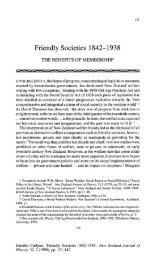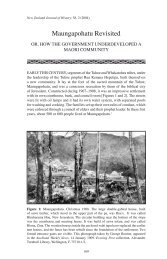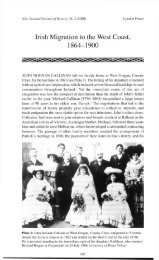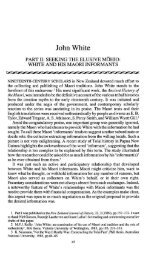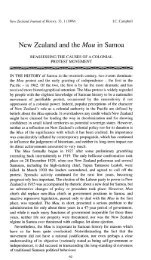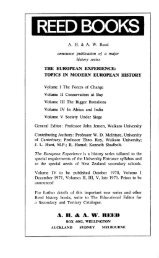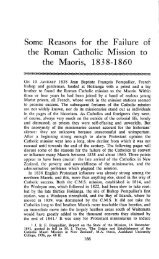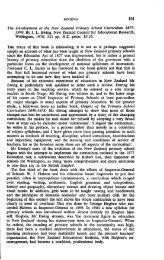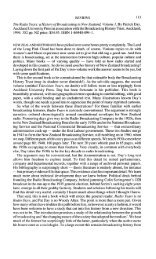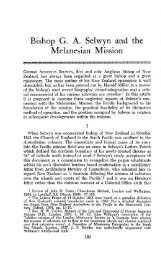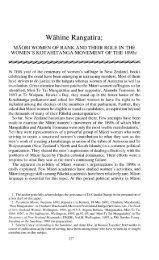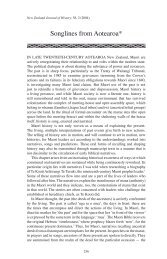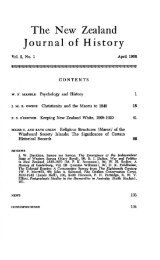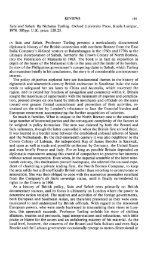Maori Oral Narratives, Pakeha Written Texts: - New Zealand Journal ...
Maori Oral Narratives, Pakeha Written Texts: - New Zealand Journal ...
Maori Oral Narratives, Pakeha Written Texts: - New Zealand Journal ...
You also want an ePaper? Increase the reach of your titles
YUMPU automatically turns print PDFs into web optimized ePapers that Google loves.
MAORI ORAL NARRATIVES, PAKEHA WRITTEN TEXTS 25<br />
defeated and I took possession of the old country [Hokianga]. Because of<br />
this battle the whole of Hokianga was finally taken by me. . . and I lived in<br />
the country because all the people had been killed." 8 All these events occurred<br />
long before Tuhaere was born.<br />
This form of narration was common in the accounts given orally in the<br />
<strong>Maori</strong> Land Court in the nineteenth century. While I have not encountered<br />
people describing and inhabiting a past before they were born, I have<br />
encountered the personal presence of the narrator in events in which they<br />
were not physically involved. The accidental shooting in 1925 of Henare,<br />
Rua's only son by his rangatira wife, Te Akakura Ru, when Henare was<br />
about 15 years old, shattered the whole community. It has been described to<br />
me by several people. Sometimes, they were the only person who witnessed<br />
the accident. The event has become a part of the life of the narrator. This is<br />
not merely dramatic emphasis, nor for the sake of telling a good story. It is<br />
what has been aridly called the 'kinship I'," and it reaches not only into the<br />
past but into the future as well: 'Thus it is that I am born in you'. To be a<br />
<strong>Maori</strong>, as the Ngati Rereahu elder Henare Tuwhangai observed in the 1985<br />
documentary programme on 'Te <strong>Maori</strong>', is to share the world with the<br />
tipuna and the whanau. Consequently, history is told in these terms.<br />
The oral histories will cluster around the immediate ancestors of the living<br />
whanau. Most of the ancestral stories recorded by Elsdon Best from<br />
Tuhoe at the beginning of this century have now passed out of local tradition.<br />
20 The focus of the whanau ancestors has moved down the<br />
whakapapa. Thus the old stories drop out, or are reworked around the different<br />
ancestors. The whanau is effectively the two or three generations<br />
back from the present family: a time span that most people can recall. A<br />
few of the narratives will, however, pass into the wider 'oral tradition'.<br />
They will, in turn, evolve. Thus the story of Rua and Pinepine on<br />
Maungapohatu has passed into Tuhoe oral tradition and is known among<br />
all Iharaira families. But when Te Puhi narrated it, she still emphasized that<br />
she knew the history only because Pinepine, her mother-in-law, had told<br />
her. Her identification of her source, Pinepine, was her means of stating the<br />
veracity of the narrative. Other versions, also stated as deriving from<br />
Pinepine, have already developed significant differences. Whaitiri, the early<br />
Tuhoe ancestress and deity of lightning, is present in Heta Rua's version of<br />
this narrative, 21 as well as in Te Puhi's. But it is only in Te Puhi's account<br />
that Christ is also present with his 'sister' ('tuahine'), Whaitiri, on the<br />
mountain top.<br />
18 Cited J. Prytz Johansen, The <strong>Maori</strong> and his Religion in its Non-Ritualistic Aspects,<br />
Copenhagen, 1954, p. 36.<br />
19 ibid.<br />
20 Jeffrey Sissons, 'Te Mana o Te Waimana. Tuhoe History of the Tauranga Valley', Ph.D.<br />
thesis, University of Auckland, 1984, p. 165.<br />
21 Told on two occasions, 18 May 1978 and 23 May 1982, and cited in Judith Binney, 'Myth<br />
and Explanation in the Ringatu Tradition', The <strong>Journal</strong> of the Polynesian Society, 93,4 (1984),<br />
pp. 359-60.



